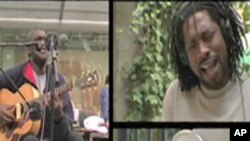Award-winning filmmaker and producer Mark Johnson is a founder of one of the most far flung musical groups in the world. For the past four years, he has brought together musicians who live thousands of kilometers apart in a project called Playing for Change. The goal of the project is to bring peace to the world through music. Johnson is currently touring North America with some of the musicians who are part of Playing for Change.
Musicians from vast backgrounds
<!-- IMAGE -->
Playing for Change unites a blind street singer from New Orleans, Native American drummers, South African choral singers, as well as musicians from a dozen other countries, ranging from Spain to Nepal. Grammy- winning producer Mark Johnson says he was struck by the power of music when he saw two monks performing on a New York City subway platform.
"On that day I saw an amazing moment when 200 people stopped, nobody got on the train, everybody was watching this music," Johnson recalls, "Some people were crying, jaw dropping and smiling. The collection of people who normally run by each other, here they are, coming together for music in a language they do not even understand."
Brainchild of
<!-- IMAGE -->
Grammy- winning producer Mark Johnson
Johnson's first recording for the project was of a street musician in Santa Monica, California singing Stand by Me. He then went around the world and, using a mobile recording studio, recorded 37 musicians singing the same song. Stand by Me was Playing for Change's first big hit. The video has been viewed on the Internet more than 30 million times. Soon, Johnson had enlisted more than 100 musicians in the project and recorded a CD and documentary DVD containing hits like One Love and Don't Worry. Titled Playing For Change: Peace Through Music, it sold over 26,000 copies in its first week.
Music with a message
But important as music is to Playing for Change, Johnson says the organization's message is about more than music. "Playing for Change is a movement of people around the world who believe that with music we can inspire each other to come together," he says, "In a world with so many divisions, Playing for Change is trying to create inspiring connections for the human race through music."
For the group's North American tour, Johnson put together a band of 10 musicians from seven countries.
Suriname soul singer Clarence Bekker was raised in Amsterdam. He says it took a while to get adjusted to playing with musicians he did not know. "The first rehearsals and getting all the band together was a strange feeling. I was a little bit nervous, because you do not know who is going to be in the band," he says, "if you are going to like these people or not. From the first second we have been together we are like one family."
Congolese musician Mermans Kenkosenki says it is a privilege to be part of the band. "It is a dream coming true [for] me," he says, "In my country, they say music is food for the soul. For me as a musician, it is a dream to be out there and spread the message. Let's make this world a better place for our children, for our future."
South African Guitarist Louis Mhlanga, who grew up in Zimbabwe, says Playing for Change is spreading an important message. "It is what the world needs, to open peoples' thoughts, to make them aware that there is love, peace, happiness and respect to be shared," he said.
In addition to performing, Playing for Change has set up a foundation whose goal is to provide musical supplies and educational programs to poor communities around the world. So far, it has established a music schools in South Africa, Ghana and Nepal and is working on a fourth one in Mali. Along with teaching young people the beauty of music, the schools are another way to spread the message of Playing for Change.
"I think that a project like this shows us that we can all come together, believe in each other," Johnson says, "respect our differences and celebrate our connections."




